|
|
|
Sort Order |
|
|
|
Items / Page
|
|
|
|
|
|
|
| Srl | Item |
| 1 |
ID:
171329
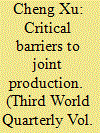

|
|
|
|
|
| Summary/Abstract |
In understanding how groups overcome collective action problems of mass mobilisation in civil wars, a joint-production explanation was put forth in the civil war literature. According to this explanation, collective action can be successful when leaders at the centre tie the public good – violence towards the overall goal of the movement – inextricably to private interests of actors at the peripheral levels of the conflict. It is through this logic of joint production that we can understand the failures of the Islamic insurgencies in Southern Philippines and the spiralling levels of violence. Where other movements cohered under a common identity, the Islamist insurgency in Southern Philippines saw high degrees of fragmentation. In this paper, I argue that cleavages of regionalism created by colonial disruptions of land and social relations became a critical barrier for insurgent joint production. Furthermore, interactions between these identities and the state can pose further collective action problems. In Southern Philippines, insurgent leaders are unable to cut across these cleavages, resulting in increasingly fragmented movements and protracted conflict. Therefore, I argue that a joint-production approach to understanding civil wars can be especially promising when culturally and historically situated to explain why collective action often fails in civil war.
|
|
|
|
|
|
|
|
|
|
|
|
|
|
|
|
| 2 |
ID:
148281
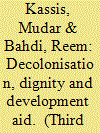

|
|
|
|
|
| Summary/Abstract |
Taking Palestine as the focus of inquiry, and drawing on our experiences as co-directors of Karamah, a judicial education initiative focused on dignity, we reflect on the attributes of colonisation and the possibilities of decolonisation in Palestine through development aid. We conclude that decolonisation is possible even within development aid frameworks. We envision the current colonial condition in Palestine as a multi-faceted, complex and dynamic mesh that tightens and expands its control over the coveted colonial subject but that also contains holes that offer opportunities for resistance or refusal. We turn to Karamah to illustrate how some judges have insisted on a professional identity that merges the concepts of human dignity and self-determination and ultimately rejects the colonial condition inherent in both occupation and development aid. We conclude that in this process of professional identity (re)formation, members of the Palestinian judiciary have helped reveal the demands of decolonisation by demonstrating their commitment to realising human dignity through institutional power, and bringing occupation back into international development discourse.
|
|
|
|
|
|
|
|
|
|
|
|
|
|
|
|
| 3 |
ID:
155141
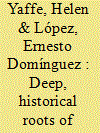

|
|
|
|
|
| Summary/Abstract |
Colonialism, imperialism and anti-imperialism have been decisive in shaping Cuban political identity for 150 years. US determination to control Cuba, consistent with the Monroe Doctrine, had a strong economic rationale even before Spain was defeated in the War of Independence in 1898. Debate raged between Cubans who aspired to true independence and an annexationalist minority, who favoured union with the US. The Platt Amendment imposed on Cuba by the US in 1903 ‘reduced the independence and sovereignty of the Cuban republic to a myth’. Between then and the Revolution of 1959 Cuba was effectively first a protectorate and then neo-colony of the US, which dominated the Cuban economy, politics and foreign policy. Tackling the terrible socioeconomic and political effects of Cuba’s subjugation under the Spanish empire and then US imperialism necessitated a radical transformation of the Cuban economy, political institutions and power structures. The transition to socialism inevitably meant confronting US imperialism – and vice versa. Since 1959, US imperialism, with its powerful allies in the right-wing exile community based in Miami, have relentlessly tried to destroy the Revolution and Cuban socialism. The issue of imperialism remains key today, in the post-Fidel, President Trump era.
|
|
|
|
|
|
|
|
|
|
|
|
|
|
|
|
| 4 |
ID:
165060
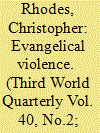

|
|
|
|
|
| Summary/Abstract |
Recognising the impact of religion on state action, this article identifies two variables that interact to affect the type and level of violence employed by Western states against Third World targets. First, variation in the degree to which the prominent Christian denominations and organisations within these states view evangelisation as either an individual-level or national-level process – Christian individualism vs Christian nationalism – has determined church support for using violence as a tactic. Second, the level of influence that churches and missionary organisations have over their home states affects the ability of Christian actors to directly impact state actions. Western violence against Third World peoples is expected to be lowest when churches and Christian organisations view evangelisation in primarily individualistic terms and have significant influence over the state. The article examines the relationships between concepts of evangelisation, Christian influence over state policies, and levels of violence against the Third World by examining British, French and German colonialism during the late colonial period of the nineteenth and twentieth centuries.
|
|
|
|
|
|
|
|
|
|
|
|
|
|
|
|
| 5 |
ID:
151501


|
|
|
|
|
| Summary/Abstract |
Regional and hemispheric reconfigurations in Latin America and the Caribbean are increasingly mediated by Brazilian power, and the engagement of Guyana, Suriname and French Guiana with this emerging context is intriguing. They are tentatively moving away from a Caribbean region with which they are culturally contiguous, towards a South American continent in which they are geographically located. This is partly a reflection of the gradual opening up of the Northern Amazonian space that they share collectively, and also with Venezuela and Brazil. These processes are occurring as cause and effect of Brazil’s emergence as a regional – and even regionally hegemonic – power. With reference to wider debates on regionalism and hegemony, we analyse the uncertain consequences of these shifts.
|
|
|
|
|
|
|
|
|
|
|
|
|
|
|
|
| 6 |
ID:
154476
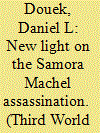

|
|
|
|
|
| Summary/Abstract |
In 1998, South Africa’s Truth and Reconciliation Commission (TRC) held hearings that investigated the possibility of foul play in the plane crash that killed Mozambican President Samora Machel on the night of 19 October 1986, near Mbuzini, South Africa. Eight persons testified in these special Section 29 hearings, held in camera because they dealt with events that remained politically volatile in the post-apartheid era. The recently declassified transcripts from these hearings strongly corroborate previous evidence indicating that the apartheid security forces caused Machel’s plane to crash, thereby eliminating one of colonialism’s most outspoken foes.
|
|
|
|
|
|
|
|
|
|
|
|
|
|
|
|
| 7 |
ID:
162626


|
|
|
|
|
| Summary/Abstract |
This reflective contribution discusses the intersection of Indigenous and Small Scale Fisheries’ (SSF) issues, and how the international SSF movement has a critical role in the broader struggle for the convergence of social justice regarding the environment, food and lifeways. I explore some of the political tensions around Indigenous and SSF struggles against global neoliberalisation of land and water resources, some of the successes and challenges of the international SSF movement, and future considerations for academic/activist ‘decolonising’ work.
|
|
|
|
|
|
|
|
|
|
|
|
|
|
|
|
| 8 |
ID:
162627
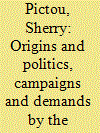

|
|
|
|
|
| Summary/Abstract |
This reflective contribution discusses the intersection of Indigenous and Small Scale Fisheries’ (SSF) issues, and how the international SSF movement has a critical role in the broader struggle for the convergence of social justice regarding the environment, food and lifeways. I explore some of the political tensions around Indigenous and SSF struggles against global neoliberalisation of land and water resources, some of the successes and challenges of the international SSF movement, and future considerations for academic/activist ‘decolonising’ work.
|
|
|
|
|
|
|
|
|
|
|
|
|
|
|
|
| 9 |
ID:
141892
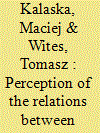

|
|
|
|
|
| Summary/Abstract |
People register and process stimuli every day, creating an image of space–time reality involving multifaceted relations between various states. The authors have created a database consisting of articles from the periodical Le Monde diplomatique from 1954 to 2009. This paper focuses on investigating how strong relations are between former colonial powers and developing countries. The authors present an index showing the frequency of coincidence of opinion-shaping content in articles about one of the selected world powers and a developing country; they next establish a quantitative reference to dependency and world-systems theories.
|
|
|
|
|
|
|
|
|
|
|
|
|
|
|
|
| 10 |
ID:
157884
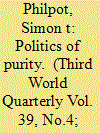

|
|
|
|
|
| Summary/Abstract |
The International Cricket Council and civil prosecutions of three Pakistani cricketers and their fixer brought player corruption in cricket to public scrutiny once more. A range of English media commentators and the sentencing judge referred to cricket’s loss of innocence because of the deception of the Pakistani cricketers. However, commercialisation, racism and dealings with corrupt political regimes have all exposed cricket as less innocent than many of its English defenders would admit. Furthermore, the demonisation of Pakistani cricketers as cheats blurs the boundary between individual responsibility and cultural characteristics with negative consequences for Muslims in the post-9/11 world.
|
|
|
|
|
|
|
|
|
|
|
|
|
|
|
|
| 11 |
ID:
148257
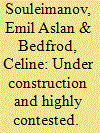

|
|
|
|
|
| Summary/Abstract |
While scholarship on Islam in the Caucasus has focused on the late Soviet religious revival – the rise of Salafi jihadism and religious radicalisation in the northern part of these strategic crossroads – no study to date has addressed the discursive struggle over the social functions of regional Islam. This article deconstructs these discourses in order to examine the very varying, and often conflicting, representations of Islam advocated by various actors across the region and within particular republics. The article highlights the contested functions of regional Islam against the background of a religious revival that is still a work in progress.
|
|
|
|
|
|
|
|
|
|
|
|
|
|
|
|
| 12 |
ID:
169120
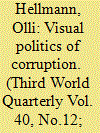

|
|
|
|
|
| Summary/Abstract |
Despite the fact that corruption is essentially invisible, communication campaigns by the global anti-corruption industry regularly feature photographic images. So far, however, we do not know much about the narratives that are encoded in these images. Through the theoretical lens of postcolonialism, this paper takes a first step towards developing an understanding of the visual representation of corruption. Specifically, the paper applies semiotic and iconographic methods to two photography competitions run by Transparency International – the major non-governmental player in the anti-corruption industry. The analysis shows, first, that the anti-corruption industry reinforces colonial stereotypes, suggesting that the ‘sinful’ and ‘irrational’ Global South is waiting to be civilised by the North. Second, through its visual imagery, the anti-corruption industry also emphasises ideas of a ‘humanitarian family’, which serves to cover up the North’s role in transnational webs of corruption. These findings are triangulated with semiotic/iconographic analyses of the Transparency International logo and the Corruption Perceptions Index map.
|
|
|
|
|
|
|
|
|
|
|
|
|
|
|
|
|
|
|
|
|